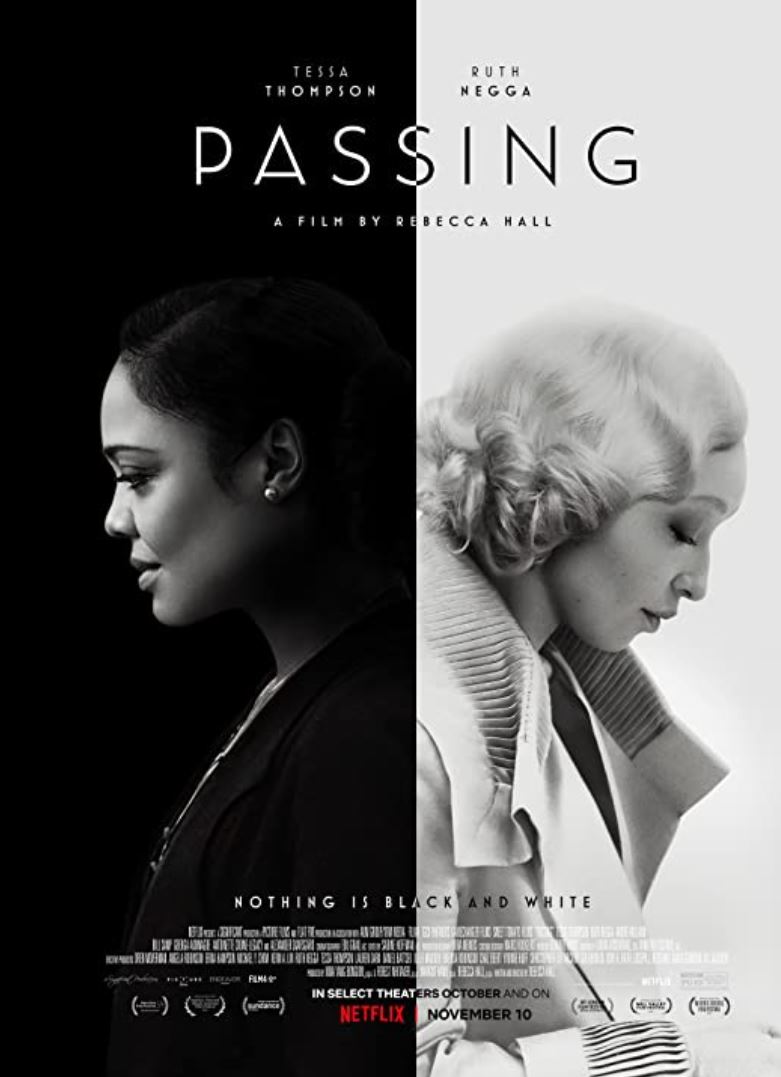Tessa Thompson and Ruth Negga in Passing



In 1920s New York, two childhood friends reconnect by chance. Irene (Tessa Thompson) is now married to a doctor and living in Harlem, the epicenter of the Black American renaissance. Clare (Ruth Negga) has moved to Chicago, where she is married to a white man and passing for white herself. Irene is alarmed to realize the risk Clare is taking, while Clare is surprised to find that Irene, herself, is not passing. Adapted by Rebecca Hall, who also directs, from Nella Larsens’s novel of the same name, Passing is an achingly tender portrait of duality, from the love/hate push-pull of friendship, to the conflicting moods of a marriage, to the racial lines bifurcating America, and it suggests that ultimately, a person is not meant to live two lives.
There is a staginess to Passing, especially in the early going, that would almost read as stilted but for the luminous performances of Thompson and Negga. As Irene and Clare, they are two sides of the same coin, women from similar backgrounds who made different choices and end up separated by the ephemeral boundaries imposed on them by society. Irene wonders why Clare isn’t happier, given that she is wealthy and has all the advantages of whiteness, but perhaps her own observation that no one is really “safe” is answer enough. And Clare, despite setting her daughter on a more advantageous path than she had, cannot stop risking her own cover to reconnect with her roots in Harlem. Clare craves the camaraderie and culture of her old neighborhood, and resents her hateful, racist husband—played with cloying charm by Alexander Skarsgard, who has perfected the art of playing unremitting assholes—and she flutters in and out of Irene’s orbit with an almost manic energy.
Irene wants to keep news of brutal anti-Black actions out of her home, but her husband, Brian (Andre Holland), insists on telling their young sons about lynchings at the dinner table. There is no use in hiding, he thinks, and only wants to prepare their children for a world that “hates [them]”. Irene hasn’t gone so far as to pass in white society, but in her own way she is choosing denial, same as Clare. They simply want different degrees of that denial. Irene just wants her home to be safe from the world at her doorstep, but Clare wants to be safe, herself, in that world. Both desires are equally impossible, though, as Irene and Clare find in their own ways. Ultimately, the violence Irene fears arrives, but it is also the discovery Clare seems to crave. Passing presents a dichotomy in which no one can be free, and whatever advantages Clare thought she was getting from passing, initially, have now become her cage.
Hall, making her directorial debut, brings a delicate sensitivity to bear on Irene and Clare. Working with cinematographer Eduard Grau, she shoots Passing in sumptuous black and white, a look at odds with the wretchedness of the world in which Irene and Clare live. Her adaptation of Larsen’s novel is focused inward, not at all interested in the trappings of the time and place, which makes her vision of 1920s New York feel particularly lived in and tangible. Instead, she shoots Thompson and Negga in ethereal light, but often from angles and distances that suggest voyeurism, that just as Clare is peeping in on the life she rejected, we are peeping in on Irene and Clare. A limited use of music, almost entirely appearing as diegetic sound within scenes, further enhances the private nature of the film. Passing is a world of questions and no answers, of dissatisfaction and stunted desire, of lively parties and desolate homes, and at its center are two women trying to make their ways only to find the same limits no matter where they go.
Passing is now streaming on Netflix.

